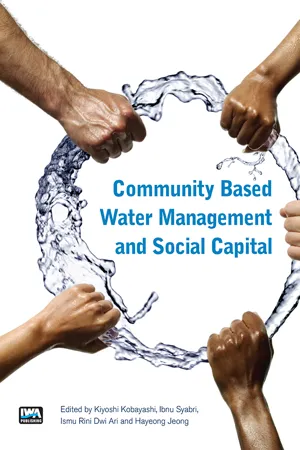
Community Based Water Management and Social Capital
- 272 pages
- English
- PDF
- Available on iOS & Android
Community Based Water Management and Social Capital
About This Book
Community Based Water Management and Social Capitalprovides scientific understanding of community based water management and how to secure responsible management to satisfy quality and quantity requirements. It shows how community based water management can be synchronized with public water service, by introducing the most recent field experiments and theoretical studies in economics, social science, engineering, and regional planning which include game theory, microeconomics, econometric, statistics, social network analysis, social choice, and micro finance.
Community Based Water Management and Social Capital presents field experiments and theoretical studies in economics, social science, engineering, and regional planning to investigate important questions: what motivates people involve in voluntary water management what is the effect of participatory approach in water management how does social capital work in the voluntary actions what are key factors for effective governance for water management with diverse actors - local people, enterprise, and government; what is necessary for proper water allocation; vi) how to synchronize public water service with community based water management.
The book provides students, researchers, practitioners and governments with a comprehensive account of the current situation and perspectives on voluntary water management. It delivers a new scientific understanding on sustainable water management schemes and appropriate institutional social structures to secure inalienable rights to access to water.
Author: Kiyoshi Kobayashi, Kyoto University, Japan, Ibnu Syabri Institute of Technology Bandung, Indonesia, Ismu Rini Dwi Ari, Brawijaya University, East Java, Hayeong Jeong, Isabel C Escobar, Andrea Schaefer.
Frequently asked questions
Information
Table of contents
- Cover
- Contents
- List of Figures
- List of Tables
- About the Authors
- Preface
- Foreword
- 1 Aspects of community-based water management and social capital
- 2 An alternative clean water supply system for community living in coastal and flood-prone areas: lesson learned from Legon Kulon
- 3 Collective action in water resource management: theoretical perspectives and propositions
- 4 Participatory approach to community based water supply system
- 5 Social capital and governance for efficient water management
- 6 Trust formation in collaborative water management
- 7 The right to water and the participatory approach
- 8 Water governance in Indonesia: from indigenous to post-colonial technology
- 9 Partial authority allocation of regional water supply system in Indonesia and economic efficiency
- 10 Asymmetric ownership between municipalities in water supply system provision in Indonesia
- 11 Comprehensive social participatory model for water springs conservation management in Indonesia
- 12 Network analysis of community based water management
- 13 A cognitive analysis of residents with regard to community-based flood management
- 14 Climate change adaptive planning and conflict resolution strategy of Krabyakan spring utilization
- 15 Sustainability of water supply synchronizing PDAM and HIPPAM in Indonesia
- Index